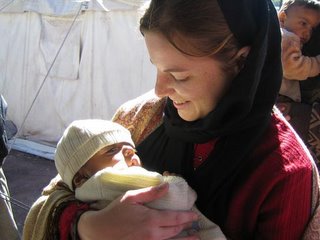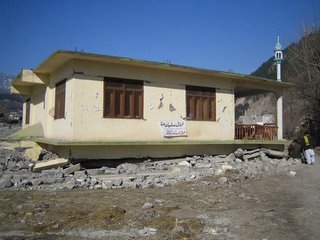 Day 8: THEY DESERVE TO BE HEARD
Day 8: THEY DESERVE TO BE HEARDPosted from Pakistan on Thursday, Jan. 26, 2006
By Amber Johnson, Metro Marketing &
Communications Director for New York
Katie Roland (L) & Amber Johnson (R)
are directors with World Vision's
Metro Marketing & Communications
offices in New York and Chicago
Perhaps there is nothing so universal as the joy in holding a baby. Four month-old Ajmal snuggled into my arms, oblivious to the fact that he was being held by a stranger. He yawned luxuriously and then gave a delighted toothless grin. Continued below.

Amber with baby Ajmal.

What you're looking at here is the (amazingly intact) second story of what used to be a two-story dwelling ... the first story was flattened beneath it during the October 8 quake, and it came straight down.
Ajmal was born on October 5, three days before the earthquake that took the lives of his parents. His mother died when the roof of their home collapsed, pinning her but narrowly missing the nearby bed where Ajmal was lying. He is now being cared for by his aunt and grandmother, and World Vision child protection officers visit regularly to make sure Ajmal's needs are met. On the day we visited, the baby had a slight cough and the child protection officer made sure the child was receiving proper medical attention.
We left Ajmal's village and traveled by car to a tent village where World Vision operates a Child Friendly Space. On the way we passed a building that appeared to have avoided major damage, though everything around it was flattened. Then a staff member pointed to the thin layer of rubble under the building. What we could see was the second floor; the first floor was completely crushed underneath it.
Once in the village we were joined by 12 women, most mothers of small children. Each had lost family members to the earthquake. Their homes were destroyed, their material possessions gone. Originally from remote mountain villages, the disaster forced them into more populated areas in order to receive the assistance they needed. Many had gone without food or water for almost a week following the earthquake. Now they live in a tent village and feed their children with the few rupees their husbands earn, and with food provided by organizations like World Vision.
Through a translator we asked if the women's children enjoyed attending the Child Friendly Space. One woman, Lalulnisa, a mother of six, stretched her arms wide and said her children love it this much. Other women nodded, stretching out their arms in agreement. One woman said her children care for the staff like mothers; they are more comfortable with the World Vision staff than their teachers, who are often strict.
The women were grateful for World Vision's help rebuilding their children's self-confidence, but there were many concerns still on their minds. Each wanted a shelter of her own; something more weather-proof than a tent, and something that allowed for more privacy, for more dignity. They worried about their children during the cold weather. One mother said that each time she feels an aftershock, she worries that her children will see her die, just as she saw her parents die during the earthquake.
Talking to these women, and walking through their tent village, built on the ruins of an earthquake flattened neighborhood, I struggle to know how to face so much loss. I struggle to know what I can do to help these women, to help Ajmal, to help Arslan, Kausar, Zainab, and Nimra, whom I've written about in previous entries.
My husband and I have exchanged many emails while I've been in Pakistan, and in an early message he said something that has stayed with me throughout my travels. Cliff wrote, "Remember every person's name and story that you can ... they deserve to be heard by someone even more than they deserve homes."

Amber with baby Ajmal.

What you're looking at here is the (amazingly intact) second story of what used to be a two-story dwelling ... the first story was flattened beneath it during the October 8 quake, and it came straight down.
Ajmal was born on October 5, three days before the earthquake that took the lives of his parents. His mother died when the roof of their home collapsed, pinning her but narrowly missing the nearby bed where Ajmal was lying. He is now being cared for by his aunt and grandmother, and World Vision child protection officers visit regularly to make sure Ajmal's needs are met. On the day we visited, the baby had a slight cough and the child protection officer made sure the child was receiving proper medical attention.
We left Ajmal's village and traveled by car to a tent village where World Vision operates a Child Friendly Space. On the way we passed a building that appeared to have avoided major damage, though everything around it was flattened. Then a staff member pointed to the thin layer of rubble under the building. What we could see was the second floor; the first floor was completely crushed underneath it.
Once in the village we were joined by 12 women, most mothers of small children. Each had lost family members to the earthquake. Their homes were destroyed, their material possessions gone. Originally from remote mountain villages, the disaster forced them into more populated areas in order to receive the assistance they needed. Many had gone without food or water for almost a week following the earthquake. Now they live in a tent village and feed their children with the few rupees their husbands earn, and with food provided by organizations like World Vision.
Through a translator we asked if the women's children enjoyed attending the Child Friendly Space. One woman, Lalulnisa, a mother of six, stretched her arms wide and said her children love it this much. Other women nodded, stretching out their arms in agreement. One woman said her children care for the staff like mothers; they are more comfortable with the World Vision staff than their teachers, who are often strict.
The women were grateful for World Vision's help rebuilding their children's self-confidence, but there were many concerns still on their minds. Each wanted a shelter of her own; something more weather-proof than a tent, and something that allowed for more privacy, for more dignity. They worried about their children during the cold weather. One mother said that each time she feels an aftershock, she worries that her children will see her die, just as she saw her parents die during the earthquake.
Talking to these women, and walking through their tent village, built on the ruins of an earthquake flattened neighborhood, I struggle to know how to face so much loss. I struggle to know what I can do to help these women, to help Ajmal, to help Arslan, Kausar, Zainab, and Nimra, whom I've written about in previous entries.
My husband and I have exchanged many emails while I've been in Pakistan, and in an early message he said something that has stayed with me throughout my travels. Cliff wrote, "Remember every person's name and story that you can ... they deserve to be heard by someone even more than they deserve homes."
Is that true? I think it is, because a new home can't restore someone's dignity, someone's sense of self-confidence, someone's willingness to face the next day. Being heard by someone can. The World Vision staff here in Pakistan are good listeners; I tried to listen well to these stories today, even to little Ajmal's, though he is much too young to tell it himself. And I hope to be able to tell these stories to others, through this blog, at churches, in conversations with friends. Perhaps together we can both hear their stories and provide shelter.

1 comment:
"How are Child Friendly Centers most different from Child Daycares that we have here in the US?"
Good question. Child Friendly Spaces (CFS) are different from daycares in two primary ways. First, the purpose of CFS is not to provide child care when parents are away from the home. Almost all of the children who attend World Visions CFS sites in Pakistan have mothers or other caretakers (aunts, grandmothers) waiting for them in their tent homes. Because the Pakistan CFS sites are in tent villages - camps of people who have been displaced because of the earthquake - the children at the CFS sites are often only a few hundred yards away from their temporary shelters.
Second, CFS sites are unlike daycares in that CFS sites are intentionally placed in communities where children have experienced a trauma (like the Pakistan earthquake, or the tsunami). World Vision believes it is important to help families physically recover from disasters; but it is also important that we care for the emotional well being of children. Child friendly spaces give children a chance to be kids: to play games, to laugh, to dance, to sing, to connect with gentle staff members who are good listeners. World Vision staff are also able to monitor children for evidence of unusual need: hunger, lack of winter clothing, abuse.
Here in Pakistan, I've had many mothers tell me that after the earthquake their children were afraid to leave their families and return to school. The October 8th earthquake happened just as the school day was beginning; 17,000 school children and 900 teachers were killed. For the children of this region of Pakistan, school is a place of difficult memories. It's easy to understand why they don't want to return.
Many mothers have also told me that the CFS sites in their communities helped children take the first step toward going back to school. They gathered with their friends, learned to laugh again, and rebuilt some of the self-confidence that was damaged during the earthquake.
You may have read the story of Arslan in one of our earlier blogs. Arslan lost both his parents in a landslide caused by the earthquake. His grandmother took him in, and because her home was destroyed they moved to a tent village where World Vision operates a CFS site. Arslan's grandmother sent him to school and the CFS each day, but at first Arslan was withdrawn. He stood to the side, not interested in joining in the activities. Slowly, thanks to the gentle work of the CFS facilitators, Arslan began to join in the activities. Though he is still a shy boy, he now actively plays with the other children and seems to be recovering from the trauma of the earthquake.
Post a Comment